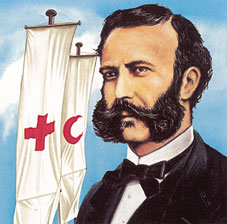
Red Cross

When he was twenty-six, Dunant entered the business world as a representative of the Compagnie genevoise des Colonies de Sétif in North Africa and Sicily. In 1858 he published his first book, Notice sur la Régence de Tunis [An Account of the Regency in Tunis], made up for the most part of travel observations but containing a remarkable chapter, a long one, which he published separately in 1863, entitled L'Esclavage chez les musulmans et aux États-Unis d'Amérique [Slavery among the Mohammedans and in the United States of America].
Having served his commercial apprenticeship, Dunant devised a daring financial scheme, making himself president of the Financial and Industrial Company of Mons-Gémila Mills in Algeria (eventually capitalized at 100,000,000 francs) to exploit a large tract of land. Needing water rights, he resolved to take his plea directly to Emperor Napoleon III. Undeterred by the fact that Napoleon was in the field directing the French armies who, with the Italians, were striving to drive the Austrians out of Italy, Dunant made his way to Napoleon's headquarters near the northern Italian town of Solferino. He arrived there in time to witness, and to participate in the aftermath of, one of the bloodiest battles of the nineteenth century. His awareness and conscience honed, he published in 1862 a small book Un Souvenir de Solférino [A Memory of Solferino], destined to make him famous.

A Memory has three themes. The first is that of the battle itself. The second depicts the battlefield after the fighting - its "chaotic disorder, despair unspeakable, and misery of every kind" - and tells the main story of the effort to care for the wounded in the small town of Castiglione. The third theme is a plan. The nations of the world should form relief societies to provide care for the wartime wounded; each society should be sponsored by a governing board composed of the nation's leading figures, should appeal to everyone to volunteer, should train these volunteers to aid the wounded on the battlefield and to care for them later until they recovered. On February 7, 1863, the Société genevoise d'utilité publique [Geneva Society for Public Welfare] appointed a committee of five, including Dunant, to examine the possibility of putting this plan into action. With its call for an international conference, this committee, in effect, founded the Red Cross. Dunant, pouring his money and time into the cause, traveled over most of Europe obtaining promises from governments to send representatives. The conference, held from October 26 to 29, with thirty-nine delegates from sixteen nations attending, approved some sweeping resolutions and laid the groundwork for a gathering of plenipotentiaries. On August 22, 1864, twelve nations signed an international treaty, commonly known as the Geneva Convention, agreeing to guarantee neutrality to sanitary personnel, to expedite supplies for their use, and to adopt a special identifying emblem - in virtually all instances a red cross on a field of white.